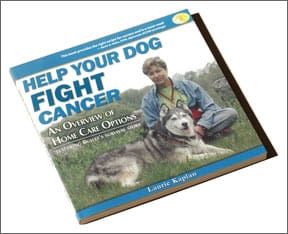Having a solid library of canine literature, or at least a shelf or two full of good books, is a great hedge against making uninformed decisions about your dog’s health. Of course, a trip to your veterinarian is your first line of defense when something is obviously wrong with your dog. But we suggest hitting the books for information before and after vet visits.

200
A good canine health handbook can help you interpret what your vet tells you, give you ideas for further questions to ask, bolster your argument for a different type of treatment, and give you a list of invaluable home healthcare practices you can put into place to speed your dog’s recovery – or better yet, prevent problems in the first place.
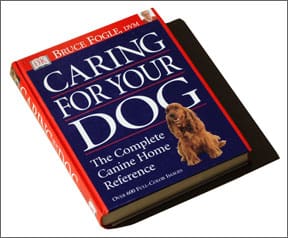
200
One challenge is finding health-oriented texts that are not dogmatic in their insistence on conventional medical approaches to the exclusion (if not derision) of all else. I’ve seen complementary and alternative approaches succeed where conventional medicine has failed too many times to throw the puppy out with the bathwater. The canine health books highlighted here take a truly holistic, inclusive approach to animal healthcare.
I have several $300 veterinary textbooks on my office shelves for reference and fact-checking articles, but it’s amazing how frequently I find the answers I am looking for in the following books!
Caring For Your Dog, by Bruce fogle, dVM. 2002, dk Publishing, inc. 448 pgs.
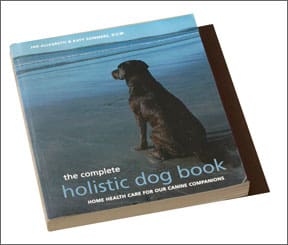
200
Only conventional medical approaches are discussed in this book, but it’s the most complete, well-researched, and well-illustrated general dog health book I’ve seen. Hundreds of color photos and medical illustrations help owners visualize the conditions and anatomy discussed. Amazingly, Dr. Fogle is refreshingly not hostile to home-prepared diets.
And no kidney stone goes unturned! The book contains at least a bit of helpful information about every medical condition I’ve ever needed to look up.
The Complete Holistic Dog Book, by Jan allegretti and katy Sommers, dVM. 2003, celestial arts. 372 pgs.
This book succinctly and convincingly describes the benefits (and basics) of a healthy lifestyle and holistic healthcare for dogs. Healthy diets and complementary modalities (acupuncture,
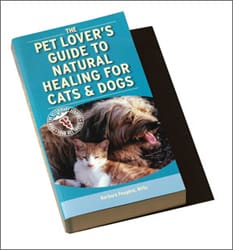
161
chiropractic, homeopathy, and herbal medicine) are described and indications for their best use are suggested. The section on the “holistic medical chest” will be useful to owners who are new to providing safe, effective home treatments for their dogs.
The Pet Lover’s Guide to Natural Healing for Cats & Dogs, by Barbara fougère, BVSc. 2006, elsevier inc. 628 pgs.
The design of this book is a little odd, but once you get past this superficial aspect, you’ll discover a wealth of suggestions on conventional and complementary treatments for numerous health conditions. Home-prepared diets and supplements are discussed in depth, and overall, Dr. Fougère’s treatment philosophies closely complement ours! As the title suggests, feline care is covered, too.
The Encyclopedia of Natural Pet Care, by cJ Puotinen. 2000, McGraw-hill. 544 pgs.
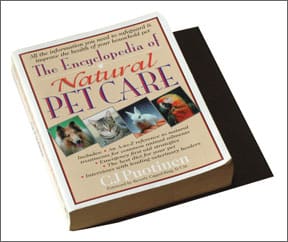
161
My copy of this book (pictured above) is a first edition; a newer edition was published in 2000. Written by longtime Whole Dog Journal contributor CJ Puotinen, this book is calm, warm, and encouraging. It gently helps inspire owners to take increasing responsibility for their animal companions’ health, through improved diet and less-toxic care practices. Puotinen describes opportunities for owners to use flower essences, herbs, supplements, and hands-on therapies to make a palpable improvement in their dogs’ health. The book also includes interviews with a number of high-profile holistic veterinarians.
Holistic Guide for a Healthy Dog, by Wendy Volhard and kerry Brown, dVM. 2000, howell Book house. 314 pgs.
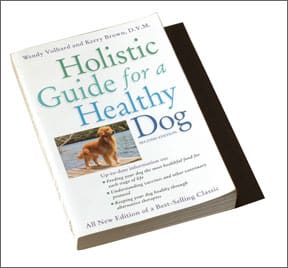
161
Wendy Volhard was one of the pioneers of home-prepared diets for dogs, and is still considered a guru for those feeding a certain type of diet. She and Dr. Brown are strong proponents of grains in canine diets, which may not jibe with other authorities’ opinions, but the authors do have decades of experience and terrific results behind them.
Sections on less-mainstream modalities such as kinesiology and homeopathy are well-described. The section on thyroid and adrenal abnormalities and treatments for these conditions is worth the price alone.
Hound Health Handbook, by Betsy Brevitz, dVM. 2004, Workman Publishing. 468 pgs.
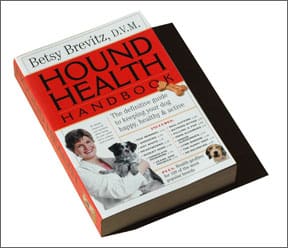
161
Only conventional medical care is recommended in this book, so you have to take suggestions on diet and vaccinations with a grain of sea salt. But Dr. Brevitz’s descriptions of the causes and symptoms of so many medical problems earns this book a place on our shelf. Also, we applaud her inclusion of a chapter on mental health and behavior problems; many veterinarians fail to consider these as “health” issues, even though the problems are responsible for the loss of millions of dogs’ lives (through euthanasia). A list of common physical health problems endemic in an alphabetical list of breeds is another highly valuable tool.
Help Your Dog Fight Cancer, by laurie kaplan. 2004, Jan-Gen Press. 120 pgs.
Obviously, this book is not a general health guide. But the author does such a thorough job in describing the total care program needed to help her dog through a long fight with cancer, that literally every type of healthcare is discussed.
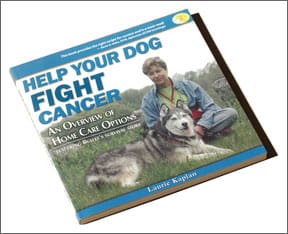
161
Kaplan discusses diagnostic tools, various cancer treatments conventional and alternative), how to interpret lab tests, and how to communicate with veterinarians and make informed medical (decisions. She also does an especially good job of describing (and illustrating with photos!) how she formulated and prepared a homemade “anticancer” diet for her dog (who, by the way, outlived his diagnosis by years).



